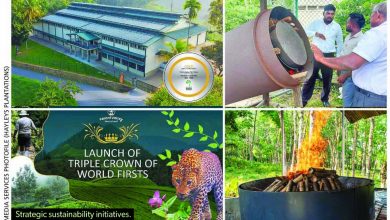YOUTH FORUM
HYPOCRITICAL DEMOCRACY
Minali Alwis Weerakkody turns the spotlight on widespread corruption
Compiled by Sandesh Bartlett
Q: What’s the good, the bad and the ugly here in Sri Lanka?
A: The nation’s greatest strength lies in the immense hospitality and kindness shown by Sri Lankans in times of need. However, we constantly bicker over varying opinions and ideologies, and fail to accept and respect those of others. This obstacle prevents us from progressing.
The ugly side to the country is the hypocritical democracy that has been institutionalised. It has given way to widespread corruption in politics with a complete disregard for the citizenry.
Q: And what are the challenges facing the country today?
 A: The global mobilisation of resources against the pandemic and its variants remains a critical challenge, as we are now witnessing a rapid spread and increase in deaths on the island. The public has begun to disregard simple precautions and is exacerbating what’s already a difficult time.
A: The global mobilisation of resources against the pandemic and its variants remains a critical challenge, as we are now witnessing a rapid spread and increase in deaths on the island. The public has begun to disregard simple precautions and is exacerbating what’s already a difficult time.
Furthermore, the lack of employment is affecting household expenses, leaving many families across the country struggling in terms of income. As such, finding proper mechanisms to provide relief, creating employment opportunities and developing training programmes to adapt to the ‘new normal’ remain issues.
Q: Do you believe that Sri Lanka will be united someday? If so, why?
A: I would love to say ‘yes’ but unfortunately, seeing the toxic behaviour and attitude of people towards each other, and the opposition towards people from a different race, religion or culture makes it extremely difficult for us to unite as a nation. However, if the younger generation is able to acknowledge, accept and respect diversity in race, religion and gender, and help each other, the country will definitely unite and prosper. This is why youth awareness is immensely important since we will be the leaders of tomorrow.
 Q: Where do you see yourself in 10 years’ time?
Q: Where do you see yourself in 10 years’ time?
A: The life lesson the pandemic taught me is that the future is unpredictable and many things can happen in 10 years.
However, if all goes well, I’ll be a barrister and help vulnerable groups in their legal battles. I will also be working with youth and children to educate them on life skills, such as communication and leadership.
Q: And where do you see Sri Lanka in a decade from now?
A: Although I’m not a big optimist, I hope to see my country cauterised of its ingrained corruption, and citizens who are more aware of their political and social rights. I’d also like to see the influence over education and employment kept at bay. Sri Lanka’s resources should be efficiently utilised to stimulate trade with attainable economic goals to repay our massive debt.
Q: Who is responsible for climate change and global warming, and what must be done about it?
A: Climate change is an accumulation of our actions over decades rather than a sudden occurrence. Therefore, I believe that everyone from our past and present – from mass production lines to cattle farmers and all of us in-between – are responsible for the damage to our planet.
Because of the pandemic, pollution has reduced since production and transport have been limited globally. So it seems that we’ve been provided with a second chance.
A collective effort will have a significant impact. For example, simple things such as avoiding single-use plastic, minimising food waste, being mindful of electricity and water consumption and so on will contribute to saving the planet. Effective government legislature to control pollution and energy consumption for mass production by factories and farms is necessary.
Q: How do you view the growing importance of social media today?
A: Social media is both a godsend and the devil’s advocate. It’s become more significant today because of the ease of access to an audience and information.
It is up to users to ensure that they retain their identity and mental health while engaging with others on these platforms. Social media can only be a weapon if it’s wielded as one.
Q: And where do you see the world in 10 years’ time?
A: The sky’s the limit in terms of technology – from human robots to spaceflights! I sincerely hope that this world – which is replete with knowledge and imagination – still preserves the human factors of life where issues of racial inequality, gender bias and absolute poverty are curtailed.
The ugly side to the country is the hypocritical democracy that has been institutionalised. It has given way to widespread corruption in politics






